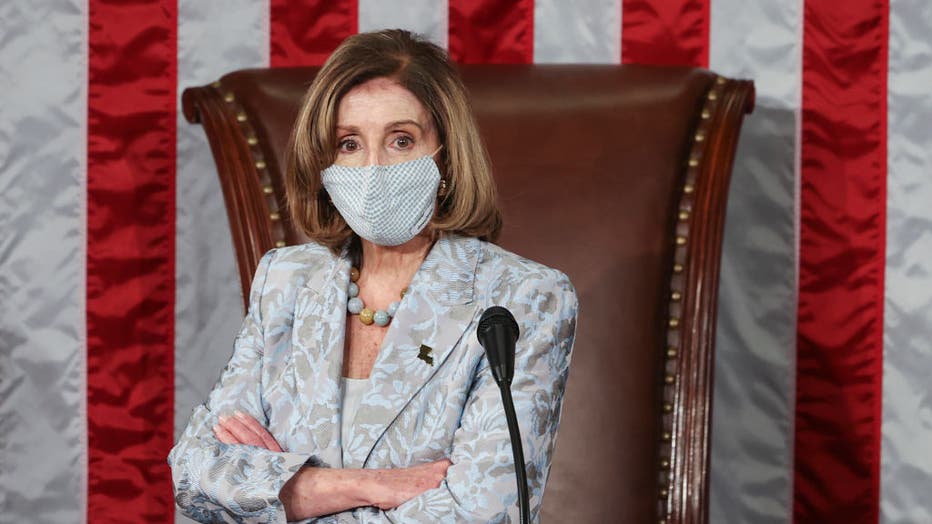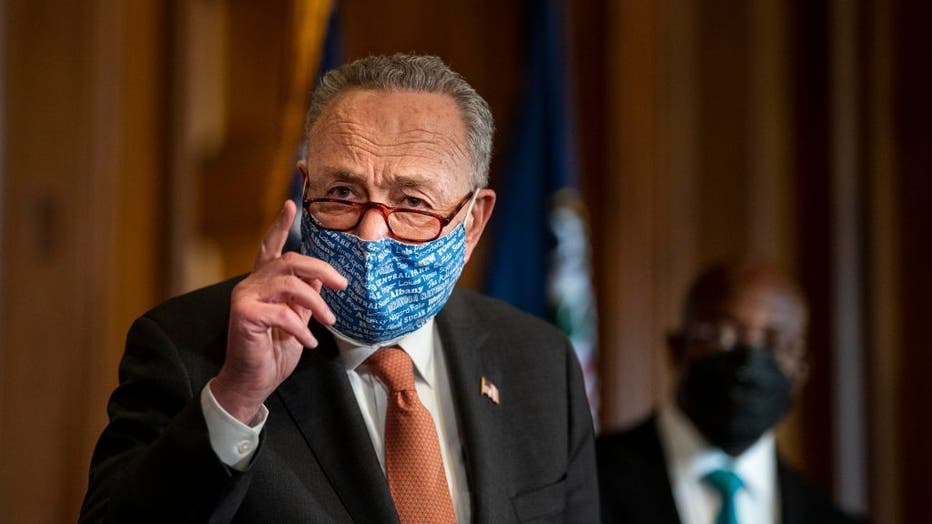House passes budget resolution for $1.9T coronavirus relief after Senate's marathon session
WASHINGTON - The House of Representatives on Friday passed an updated budget resolution sent over from the Senate that paves the way for Democrats to push through President Biden's $1.9 trillion coronavirus relief package without needing any GOP support.
The vote was 219-209 to adopt the budget framework that the Senate approved early Friday morning thanks to a tie-breaking vote cast by Vice President Kamala Harris.
The measure unlocks the process for lawmakers to now draft a final coronavirus relief bill under the budget reconciliation rules that would let Democrats avoid a GOP filibuster and pass the major stimulus legislation on their own as long as their caucus remains united.
RELATED: Jobless claims fall to 779,000; layoffs grind on
House Speaker Nancy Pelosi, D-Calif., and Democratic leaders huddled with Biden at the White House Friday afternoon. Pressed on whether they'd finalize the major aid package before March 14 when the current unemployment insurance benefits expire, Pelosi was confident about meeting the deadline.
"Absolutely," Pelosi said outside the White House. "Without any question. Before then."

Speaker of the House Nancy Pelosi (D-CA) waits during votes in the first session of the 117th Congress in the House Chamber at the US Capitol on January 3, 2021 in Washington, DC (Photo by TASOS KATOPODIS/POOL/AFP via Getty Images)
Now the relevant House congressional committees get to work on drafting the details of coronavirus relief legislation and will send the text to the Budget Committee by the end of next week, Pelosi said.
There, the Budget Committee will package all the proposals into one bill and make sure it meets all the parliamentary requirements necessary in the Senate to pass a bill by budget reconciliation. This process allows Democrats to approve the relief bill with a simple majority vote and avoid the traditional 60-vote threshold needed to advance most legislation.
Once passing muster in the Budget Committee, the coronavirus relief legislation would then head to a final vote in House and then to the Senate. Pelosi said Friday she hopes passage will take just about "two weeks."
RELATED: 'I am optimistic now': Post-pandemic hiring could rebound quickly
"Around that time, we hope to be able to put vaccines in people's arms and money in people's pockets," Pelosi said.
The legislation is expected to include more direct payments, money for vaccine distribution, aid for school reopenings and help for struggling businesses.
"This is about people's lives," Biden said Friday during his meeting with the Democrats on the urgency of delivering relief.
Republicans want a smaller relief package and balked at the price tag of Biden's $1.9 trillion proposal, especially since Congress just passed a relief bill in December.
Rep. Michael Burgess, R-Texas, said it's been "disappointing" that Democrats are using a "partisan process" to pass coronavirus relief when Biden just last month was calling for unity during his inauguration.
The budget reconciliation resolution "will drastically increase the deficit [and] seek to implement nonessential partisan policies," Burgess said.
The House already passed a budget resolution along party lines on Wednesday but needed to align with the Senate's version following the upper chamber's marathon overnight session that produced a revised budget framework around 5:30 a.m. Friday. The final vote in the Senate was 51-50, with all Republicans voting "no" and Harris called in to join with all 50 Democrats.
During the Senate session, several GOP-backed amendments were approved aimed at reining some of Biden's priorities, including prohibiting an increase in the federal minimum wage to $15 an hour during a global pandemic.

Senate Majority Leader Chuck Schumer (D-NY) leads a press conference to introduce new Senators like Senator Raphael Warnock (D-GA), and Jon Ossoff (D-GA) on Capitol Hill in Washington, DC Thursday January 21, 2021. (Photo by Melina Mara/The Washingto
The chamber also voted 99-1 to approve an amendment backed by Sens. Joe Manchin, D-W.Va., and Susan Collins, R-Maine, barring "upper-income taxpayers" from eligibility for the third round of direct cash payments.
The votes, however, are non-binding and the House can ignore them when drafting the final legislation.
Get updates on this story from foxnews.com.

